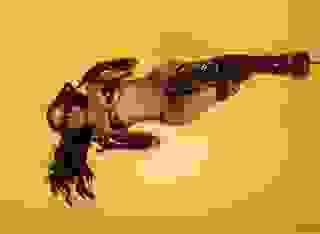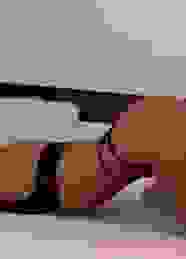All Comments on 'House Ravenin - The Folded Path Pt. 03'
by MasterRavenin
- 1 Comment
MasterR - this story is unique, and very ambitious. I enjoyed it hugely.
The writing style you chose is difficult to pull off. I think it had to sound a bit archaic and formal, because the entire framework of the Path is that way, and living the Folded Path means owning truths and the joy of reciprocal obligations of service and honor that are created in an instant, but also inherited from generation to generation through centuries. Words carry centuries, even millennia, of history within their evolution of meaning; using the old words, and old ways and rhythms of language, reinforces the central thesis of the world you've created.
The thing is - if there are also simple grammatical mistakes, archaisms can sound like errors, not brilliance.
The most common true errors here are spelling homonyms - things like "taught" when you mean "taut", or "eminent" when you mean "imminent" or 'allude" when you mean "elude", alongside the very conventional errors of "it's" when you mean "its" and "you're" when you mean "your", and the construction of compound pronoun phrases in ways that misuse objective or nominative pronouns ("her and I" will always be wrong, for example; if "her" is correct, the "I" needs to be "me").
These errors get in the way of, and can entangle the reader's desire to feel, the real word magic I think you're working here. For example, you use "whom". Current English often ignores "whom" - when it's used, it's starting to sound archaic, and I think when you use it, that's the emotional punch you want it to have.
But if that's what you're striving for, be careful to use it right. It isn't, historically, a substitute for "who". It's the object form of "who;" using "whom" where "who" is correct to an ear that truly appreciates the evolving history of English might sound archaic, but mostly it'll sound like you missed your target, because it also sounds wrong.
If you don't catch homonym errors or grammar errors (and these days, few of us have editors who are really really good at that!) then it interferes with the reader's appreciation of word choices and grammar that I believe you mean to evoke the transmitted meme-truth of centuries, the consistency and dept of meaning even as forms change. You really don't want your reader saying "hmm - is this one an intended archaism or just a mistake?"
If you clean that up, really cool stuff starts to emerge.
For example at one point you use "brunt" in an unusual way. Now, "brunt" is something you face as the bulk of the opposing power and energy, whether of natural phenomena ("brunt of the storm") or of organized forces ("brunt of the attack"). But it is not power and energy itself; it's the center of moving mass against you. You have Mirakantao use it in that normal way on page 13 of part 2.
Normally it's not an attribute of an organization or family. One would not, ordinarily, say "a family's artistic brunt" even if you're talking about the Picasso clan. So in part 3 on page 1 when you say "...House Ciav, high family of Illunais. With their diplomatic brunt, dishonorable laws could be passed very unusual to see... " this reader is a bit taken aback, but also a bit intrigued.
My first reaction - someone might face the brunt of House Ciav's diplomatic effort, or you might say the brunt of their attack came through diplomacy - but "their diplomatic brunt" is - odd. Was it an error, and you meant "tendency" or "significant talent and skill?" Perhaps were searching for "diplomatic bent" not "diplomatic brunt", as in "he had a musical bent" or "she had a mathematical bent" or "The Picasso family had an artistic bent."
But - I think maybe you're not picking the wrong word off the shelf; I think you're inviting the reader to see an old word in a new and complex way. Which is a very "Folded Path" thing to do. And I like it, and other similarly ambiguous spots, very much. So if you did it on purpose, good on you! That kind of thing makes the reader a participant in the Folded Path, as - without explaining it - you let an unusual word choice and usage open quite a new window on meaning.
So I think it's appropriate to say well done!
Just it'll work better if you clean up the simple homonym and grammar errors. Then your readers won't be left wondering whether they're reading an error, or whether they're reading the supremely subtle use of forms of language of a true - let's say, Master of Language.
PS - anytime one writes to coach another about grammar or spelling, and lacks a really good editor, Skitt's Law comes into play. Please forgive spelling and grammatical errors you may find in this comment. I console myself with the old adage - those who can't do, (at least might) teach.














